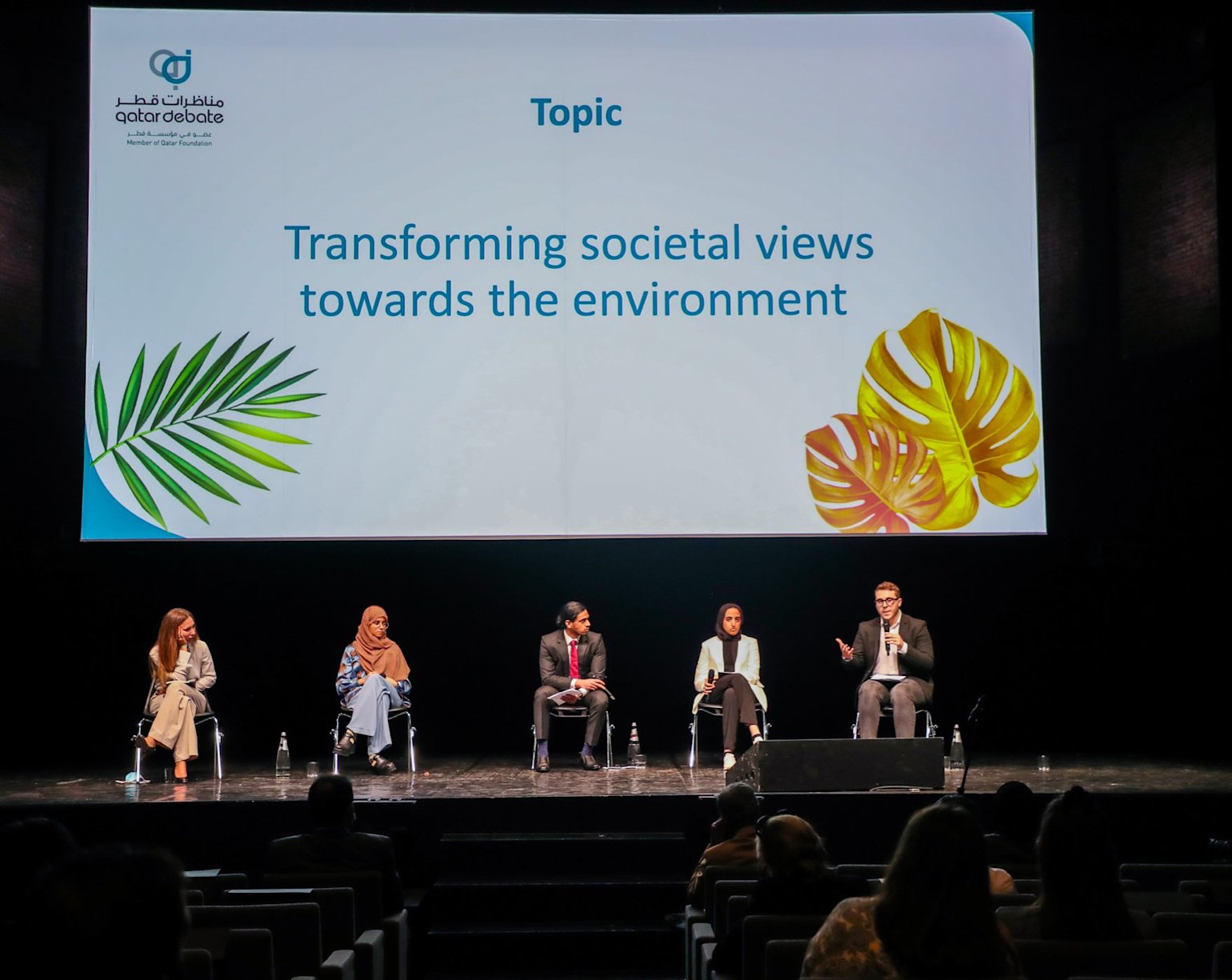Coronavirus (COVID-19) Updates
For the latest COVID-19 information and updates from Qatar Foundation, please visit our Statements page

QatarDebate participants at Youth4Climate address societal perspectives on the environment
Four debaters from Qatar Foundation member QatarDebate have spotlighted their personal sustainability initiatives at the Youth4Climate conference in Italy, with the aim of empowering audiences to believe and follow their passion.
In a debating panel titled Transforming Societal Views Towards The Environment, Moza Al Hajri, a debater from Qatar, explained why she took up veganism, which to her was the single most impactful thing she could do on the personal front to help flight climate change. “When we think about climate change and sustainability, we think about solar energy, plastic waste, car pollution and so forth,” she said. “We never think of the effects of our food choices.”

The QatarDebate panel formed part of QF’s participation in the Youth4Climate conference.
Al Hajri went on to outline the damage that the animal farming industry causes. She pointed out that more 70 billion animals are killed for food every year, saying: “This is a huge number, and shows that humans have interfered with breeding,” and explained how the farming industry uses large amounts of land and water, and even emits a level of pollution that is greater than cars and airplanes combined.
And according to Al Hajri, who is also a member of the Ajyal Film Club – a platform she chose to help promote veganism in Qatar – this means “plant-based options are better, because every single meal matters.”
Another debater from Qatar, Sara Al Maadeed, a science enthusiast who is engaged in fighting electronic climate waste, raised the point that all industries – whether healthcare, medicine, food, or transport – are based on science, and this means environmentalism is uniquely scientific.
The million-dollar question is – how can science fix a problem it created?
“So, the million-dollar question is – how can science fix a problem it created?” Al Maadeed asked the audience.
She pointed out that big polluters, such as oil and pharmaceutical companies, are not going to suddenly stop operating, and the best way to make them answerable for their contribution to climate change is to legally bind them to environment research – which she said would be a small ask that directly offsets their business activities that affect the climate.
Without our actions, organizations wouldn’t be held accountable
Raising a similar notion was Ludovica Porro, a speaker from Italy, who said activism has taught her that she needed to be vegan, recycle and upcycle, ride a bicycle instead of driving a car, and turn off the tap when brushing her teeth, among other things. But when she would turn on the news, she would see oil companies starting their expansion plans or big companies investing more in marketing instead of renewable energy.
“It made me wonder ‘what am I doing?’” she said. “I asked myself if my personal awareness and efforts were worth anything. It made me feel like quitting.
To solve the problem of fake news is to be critical of everything we read
“But I thought – what if we all quit, would we still be here? No, we wouldn’t. We wouldn’t know about what these organizations are doing. Being an activist has brought so many important things to the front – we wouldn’t know of the Paris Agreement or the Kyoto Protocol. Without our actions, organizations wouldn’t be held accountable.”
Having big companies being truly ethical and sustainable was a notion raised by Vito Gessia, a national debater also from Italy. His argument was that people buy many more clothes than they really need, and this needs to be corrected.
“The answer is in a circular economy,” he said “We should take old clothes and upcycle them. Discarded fabrics or clothes should be sewed again and sold back into the market. Many luxury brands are jumping on the upcycle trend. But is it only a trend?”
The four debaters shared their perspective on various questions raised by moderator Mubarrat Wassey – one of which was on fake news – which saw all debaters share the same responses.

Young debaters shared their perspectives on climate activism and the role of youth in taking and encouraging action to fight climate change.

Al Hajri said that it should be a given that people need to do their own research and make sure online sources are credible; while Al Maadeed raised the fact that the pandemic has shown the true extent of the current anti-science movement, causing all sorts of misinformation and fake news.
“Social media is a great tool, and this is where the youth can come in and help by simplifying scientific knowledge and sharing with readers, instead of having readers assume whatever they want because they can’t understand complex scientific language in a piece or article that’s written,” Al Maadeed said. “This is dangerous.”
Meanwhile, Gessia said he picked up a very important skill from debating: the ability to be critical. “I question everything I see and read, including the newspapers and news shows on TV. Media manufactures news that suits their agenda. To solve the problem of fake news is to be critical of everything we read.”

